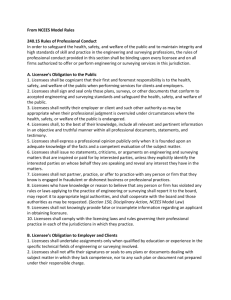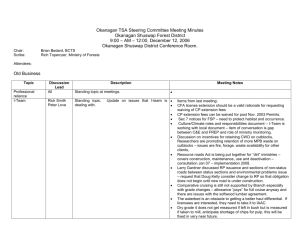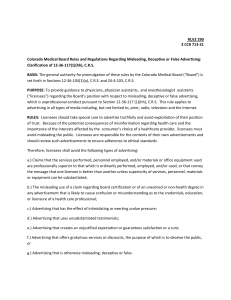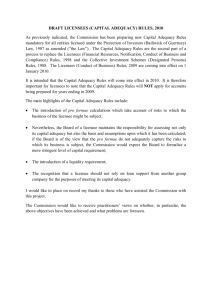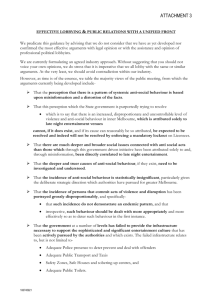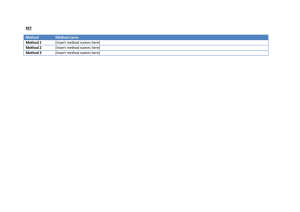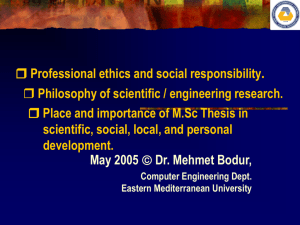16-Ethics
advertisement
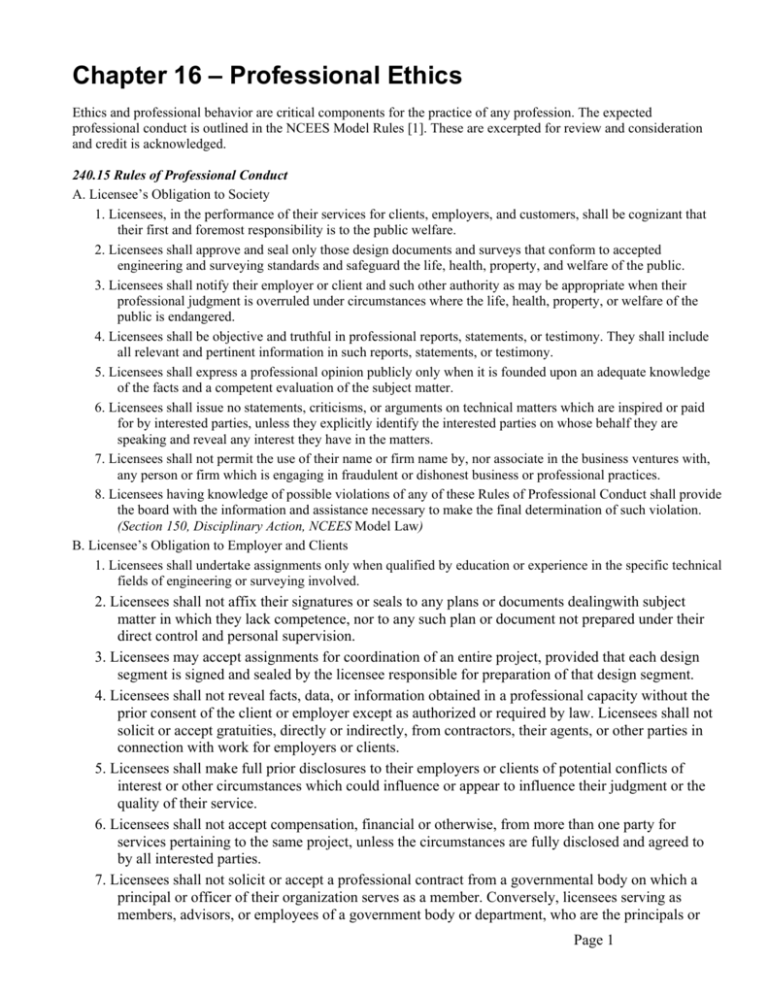
Chapter 16 – Professional Ethics Ethics and professional behavior are critical components for the practice of any profession. The expected professional conduct is outlined in the NCEES Model Rules [1]. These are excerpted for review and consideration and credit is acknowledged. 240.15 Rules of Professional Conduct A. Licensee’s Obligation to Society 1. Licensees, in the performance of their services for clients, employers, and customers, shall be cognizant that their first and foremost responsibility is to the public welfare. 2. Licensees shall approve and seal only those design documents and surveys that conform to accepted engineering and surveying standards and safeguard the life, health, property, and welfare of the public. 3. Licensees shall notify their employer or client and such other authority as may be appropriate when their professional judgment is overruled under circumstances where the life, health, property, or welfare of the public is endangered. 4. Licensees shall be objective and truthful in professional reports, statements, or testimony. They shall include all relevant and pertinent information in such reports, statements, or testimony. 5. Licensees shall express a professional opinion publicly only when it is founded upon an adequate knowledge of the facts and a competent evaluation of the subject matter. 6. Licensees shall issue no statements, criticisms, or arguments on technical matters which are inspired or paid for by interested parties, unless they explicitly identify the interested parties on whose behalf they are speaking and reveal any interest they have in the matters. 7. Licensees shall not permit the use of their name or firm name by, nor associate in the business ventures with, any person or firm which is engaging in fraudulent or dishonest business or professional practices. 8. Licensees having knowledge of possible violations of any of these Rules of Professional Conduct shall provide the board with the information and assistance necessary to make the final determination of such violation. (Section 150, Disciplinary Action, NCEES Model Law) B. Licensee’s Obligation to Employer and Clients 1. Licensees shall undertake assignments only when qualified by education or experience in the specific technical fields of engineering or surveying involved. 2. Licensees shall not affix their signatures or seals to any plans or documents dealingwith subject matter in which they lack competence, nor to any such plan or document not prepared under their direct control and personal supervision. 3. Licensees may accept assignments for coordination of an entire project, provided that each design segment is signed and sealed by the licensee responsible for preparation of that design segment. 4. Licensees shall not reveal facts, data, or information obtained in a professional capacity without the prior consent of the client or employer except as authorized or required by law. Licensees shall not solicit or accept gratuities, directly or indirectly, from contractors, their agents, or other parties in connection with work for employers or clients. 5. Licensees shall make full prior disclosures to their employers or clients of potential conflicts of interest or other circumstances which could influence or appear to influence their judgment or the quality of their service. 6. Licensees shall not accept compensation, financial or otherwise, from more than one party for services pertaining to the same project, unless the circumstances are fully disclosed and agreed to by all interested parties. 7. Licensees shall not solicit or accept a professional contract from a governmental body on which a principal or officer of their organization serves as a member. Conversely, licensees serving as members, advisors, or employees of a government body or department, who are the principals or Page 1 employees of a private concern, shall not participate in decisions with respect to professional services offered or provided by said concern to the governmental body which they serve. (Section 150, Disciplinary Action, NCEES Model Law) C. Licensee’s Obligation to Other Licensees 1. Licensees shall not falsify or permit misrepresentation of their, or their associates’, academic or professional qualifications. They shall not misrepresent or exaggerate their degree of responsibility in prior assignments nor the complexity of said assignments. Presentations incident to the solicitation of employment or business shall not misrepresent pertinent facts concerning employers, employees, associates, joint ventures, or past accomplishments. 2. Licensees shall not offer, give, solicit, or receive, either directly or indirectly, any commission, or gift, or other valuable consideration in order to secure work, and shall not make any political contribution with the intent to influence the award of a contract by public authority. 3. Licensees shall not attempt to injure, maliciously or falsely, directly or indirectly, the professional reputation, prospects, practice, or employment of other licensees, nor indiscriminately criticize other licensees’ work. (Section 150, Disciplinary Action, NCEES Model Law) The largest engineering society, The Institute of Electrical and Electronics Engineers, has developed a code of ethics. [2] IEEE Code of Ethics We, the members of the IEEE, in recognition of the importance of our technologies in affecting the quality of life throughout the world, and in accepting a personal obligation to our profession, its members and the communities we serve, do hereby commit ourselves to the highest ethical and professional conduct and agree: 1. to accept responsibility in making decisions consistent with the safety, health and welfare of the public, and to disclose promptly factors that might endanger the public or the environment; 2. to avoid real or perceived conflicts of interest whenever possible, and to disclose them to affected parties when they do exist; 3. to be honest and realistic in stating claims or estimates based on available data; 4. to reject bribery in all its forms; 5. to improve the understanding of technology, its appropriate application, and potential consequences; 6. to maintain and improve our technical competence and to undertake technological tasks for others only if qualified by training or experience, or after full disclosure of pertinent limitations; 7. to seek, accept, and offer honest criticism of technical work, to acknowledge and correct errors, and to credit properly the contributions of others; 8. to treat fairly all persons regardless of such factors as race, religion, gender, disability, age, or national origin; 9. to avoid injuring others, their property, reputation, or employment by false or malicious action; 10. to assist colleagues and co-workers in their professional development and to support them in following this code of ethics. Page 2 Approved by the IEEE Board of Directors February 2006 [1] Model Rules, National Council of Examiners for Engineering and Surveying, Clemson, SC, http://www.ncees.org/introduction/about_ncees/ncees_model_rules.pdf, 2005 [2] Code of Ethics, Institute of Electrical and Electronics Engineers, Piscataway, NJ. http://www.ieee.org/ Page 3
